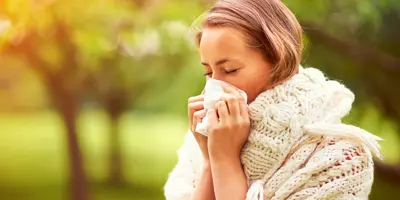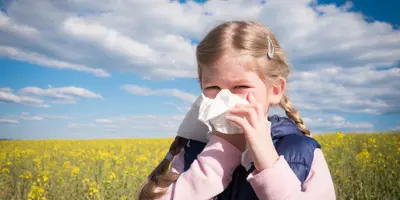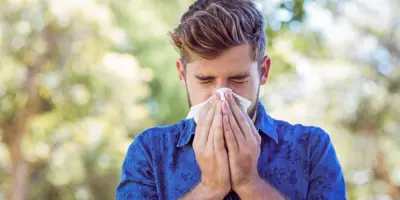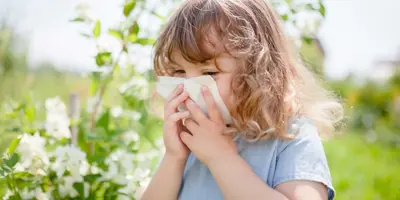2 people found this helpful

Ever found yourself sneezing after exercise? Having itchy eyes when playing sports outdoors? If you’re not exercising with a cold, chances are there’s something in the air. So, should a runny nose when exercising be a reason for you to skip a workout altogether? Not necessarily. Discover the link between sport and pollen allergies, and how to deal with them.
Exercising with an allergy: the symptoms
Before we start looking at handy tips that will help you exercise with an allergy, exercise-induced rhinitis is a key term to get to grips with. It can affect both allergic and non-allergic exercisers in the same way, and it simply refers to inflammation of the nasal passageways.
This often results in sneezing, congestion and a runny nose – exactly the sort of symptoms you may experience when running with hay fever, for example. In addition to the nasal symptoms, you might also find your eyes become itchy and watery. Your throat may feel scratchy, too.
Pop a packet of Cushelle Pocket Pack Tissues in your exercise gear when you head out. They’re ideal for catching sneezes and sniffles, while being kind to your skin.
That’s the symptoms identified, let’s move onto how to tackle issues like exercise-induced rhinitis.
Exercising or running with hay fever: top tips for dealing with pollen
Whether you find yourself sneezing after exercise or having a runny rose when running, the following tips will help you keep up with your regime when the pollen count is up:
- Go easy to start with. Whatever exercise you’re doing, if it’s outdoors you need to start off slow. That way you can gradually see how you’re reacting and stop if necessary. Listen to your body. If you find that your allergies are really kicking off, you can try one of the following tips.
- Train on cooler days. If you look outside and see that it’s dry, hot and a little breezy, that’s the ideal time for pollen to swirl around. So, if you can, it’s best to give outdoor training a miss on these days.
- Choose your time wisely. If you find yourself dealing with a runny nose when exercising at certain times of the day, that’s because the pollen count fluctuates. Get to know the time of day that seems to kick off your allergies and try doing your activities at another time – it could be as simple as that.
- Wear a mask. A facemask is something you can try if you can’t switch times. Just make sure it’s light and one that you can breathe through easily.
- Take your meds. If you’re taking something to deal with your allergies, make sure you’re up-to-date with the dosage before exercise. You can also try an additional nasal spray – they can open up your airways to help get you through the workout. As always, consult your doctor if there’s anything that you’re unsure of.
- Take it inside. Sometimes exercise and running with hay fever may just be too uncomfortable, whatever you try. That’s the time to move your workouts indoors and leave the al-fresco training for another day.
As you can see, allergies don’t have to interrupt your enjoyment of sport, and neither does a runny nose when running. With the right approach, there’s no reason to give up on your fitness regime just because the pollen count is high. Give these tips a try and get back to enjoying your exercise.
Related articles
The truth behind hay fever causes: hay fever myths debunked
What causes hay fever? We debunk the myths surrounding hay fever triggers and answer common questions like is hay fever contagious? Find the answers here.

5 natural and herbal remedies for hay fever to try at home
Want to know how to treat a pollen allergy at home? Discover five options, from herbal teas and steaming to herbal remedies for hay fever relief, here.

A guide to cross-reactivity allergy issues
Are you looking for info about cross-reactivity? Oral allergy syndrome? Latex-fruit syndrome? Discover the facts, and what you can do about it, here.

Pollen allergies: symptoms & diagnosis
Discover common grass and tree pollen allergy symptoms. Find information on what happens in a pollen allergy test, and how to get a hay fever diagnosis, here.

What is hay fever? A comprehensive guide to hay fever symptoms
Learn all about the common hay fever symptoms, such as hay fever eyes, and how to tell whether they’re caused by allergens or something else, like a cold.

Pollen allergy in children: How to cope with kids’ hay fever
The symptoms of pollen allergy in children can be tackled. Click here for tips on how to treat hay fever in children.



